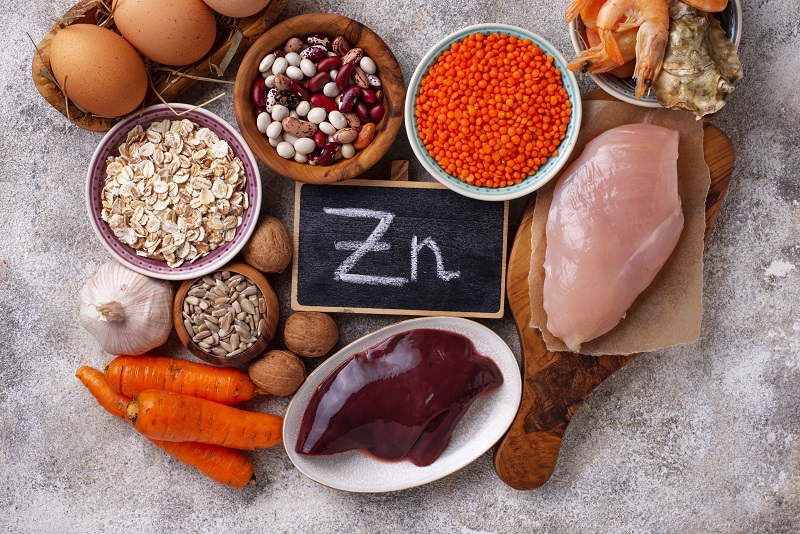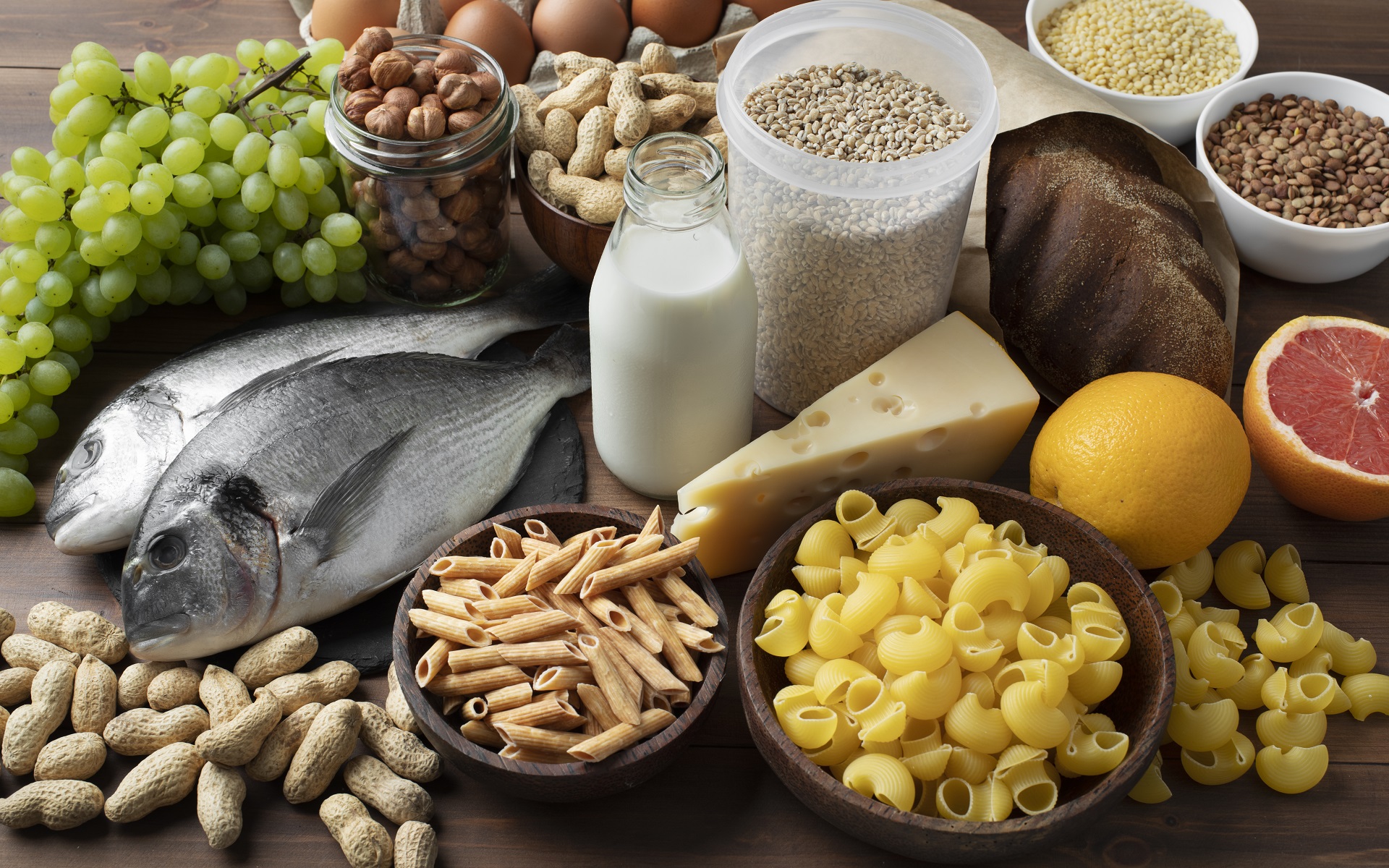Zinc is an essential mineral for the proper functioning of the immune system and not only that. In terms of abundance, it is the second most abundant trace element in the body, demonstrating its important role in the body. More than 300 enzymes and even more transcription factors covering the entire body depend on zinc.
Zinc – Sources and absorption
A rich source of zinc are the following products:
- meat and liver
- oysters and fish
- rennet cheeses
- wholemeal products (dark bread, buckwheat groats)
- nuts and pumpkin seeds
- eggs

The mineral is mainly absorbed in the small intestine and to a lesser extent in the stomach and large intestine. During digestion, it is released from food in the form of free Zn 2+ ions . These ions must be transported into the cells of the intestine and then into the circulation system and from the circulation system to the cells that need it. Two types of zinc transporters are involved in these processes: zinc-regulated transporter-like proteins (ZIP) and zinc transporters (ZnT). The uptake rate is approximately 16-50%, depending on the accompanying deficiency.
Certain dietary factors interfere with absorption, such as:
- excess sugar
- low protein intake
- high intake of calcium and iron
- high intakes of phytates, fibre and oxalates present in plant products.
It helps in the absorption of the presence of animal protein and amino acids and citric acid.
The efficiency of zinc assimilation depends on the number of accompanying factors that reduce this process, namely:
- dietary errors
- vegetarian diet
- drinking alcohol
- environmental pollution
- stress
- use of highly processed products
- strenuous physical work and intensive sporting activities.
The demand for zinc increases during the growth period, in pregnancy and lactation.
The role of zinc in building up immunity
Zinc acts on cells involved in both innate and adaptive immunity (e.g. monocytes, NK cells, T and B cells), influencing their survival, proliferation and maturation. The function of almost all immune cells depends on this element. The balance between different subsets of T helper cells and T cell function depends on levels of this micronutrient. In addition, the maturation and differentiation of T cells in the thymus largely depends on zinc. Zinc ions are recognised as inhibitors of protein phosphatases, which ultimately prolongs immune cell signalling and enhances immune responses. It influences antibody production, lymphocyte differentiation and inflammatory signalling. It is not surprising that zinc supplementation is indicated to restore immune function in infectious diseases. The mineral also has direct antiviral properties (e.g. in influenza). Therefore, lozenges with the right content and form of zinc can be taken supportively to recover faster. During a cold, it can reduce the severity, frequency and duration of discomfort (up to 42% when applied topically). A meta-analysis by Tabatabaeizadeh S. suggests that zinc supplementation reduces mortality in patients with COVID-19. The element also has the potential to reduce the development of chronic infections with other viruses, e.g. HSV, HCV, by interfering with viral replication, among others. Adequate saturation of the body with zinc protects against over-reactivity of the immune system, which counteracts the development of autoimmunity or allergy.

Effects of zinc deficiency in the body
There is an increased risk of zinc deficiency in older people, vegans/vegetarians and people with chronic diseases (including inflammatory bowel disease). It is estimated that approximately 30% of the elderly population has deficiencies, who are additionally at higher risk of complications accompanying infections and have a reduced immune capacity due to age.
Many cellular functions such as intracellular killing of harmful pathogens, maturation and function of T and B cells, production of cytokines and free radicals are impaired due to zinc deficiency. Acute deficiency causes a decrease in innate and acquired immunity, while chronic deficiency increases inflammation in the body. Immune dysfunctions caused by deficiency of this essential compound lead to various disorders at the whole body level: allergies, frequent infections, increased risk of cancer, various autoimmune diseases and chronic inflammation, which can increase insulin resistance, exacerbate depression, etc.
What to consider when choosing and using zinc ?
As zinc together with copper compete in the body for absorption, excessive use of one of the elements, e.g. zinc, may result in copper deficiency, as well as iron deficiency. A formulation containing a set of zinc together with copper in the right proportions will be safer for longer use. In addition, it is advisable to take intervals and check e.g. the level of alkaline phosphatase, whose level in the blood is dependent on zinc and can indirectly show at what stage of saturation the body is. Zinc in the form of citrate will be one of the best options because, as mentioned, citric acid aids the absorption of this compound. In order to avoid the potential nausea that any form of zinc can cause, it is best to supplement with a meal.
Bibliography:
Wessels I, Maywald M, Rink L. Zinc as a Gatekeeper of Immune Function. Nutrients. 2017 Nov 25;9(12):1286.
Read SA, Obeid S, Ahlenstiel C, Ahlenstiel G. The Role of Zinc in Antiviral Immunity. Adv Nutr. 2019 Jul 1;10(4):696-710.
Stiles LI, Ferrao K, Mehta KJ. Role of zinc in health and disease. Clin Exp Med. 2024 Feb 17;24(1):38.
Mocchegiani E, Romeo J, Malavolta M, Costarelli L, Giacconi R, Diaz LE, Marcos A. Zinc: dietary intake and impact of supplementation on immune function in elderly. Age (Dordr). 2013 Jun;35(3):839-60.
Kim B, Lee WW. Regulatory Role of Zinc in Immune Cell Signaling. Mol Cells. 2021 May 31;44(5):335-341.
Tabatabaeizadeh SA. Zinc supplementation and COVID-19 mortality: a meta-analysis. Eur J Med Res. 2022 May 23;27(1):70.

